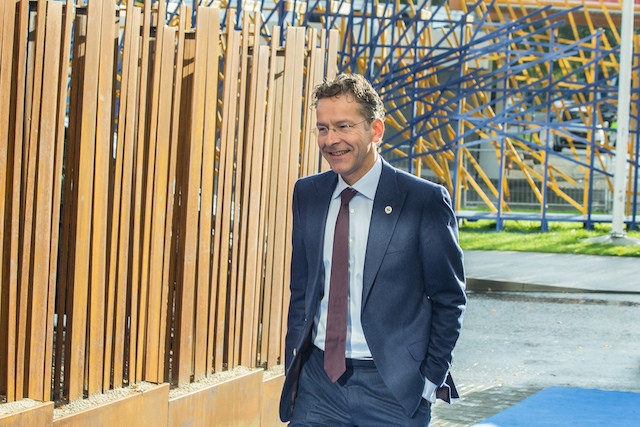Speaking after the conference on the European Stability Mechanism’s 5th anniversary, in Kirchberg on Thursday 30 November, Dijsselbloem did not want to express his opinion on the upcoming election of his successor. He just said that “I love them all very much” and that he was “very glad” that there were four candidates. Luxembourg finance minister Pierre Gramegna officially announced his candidacy, along with Mario Centeno, minister of finance of Portugal, Peter Kazimir, minister of finance of Slovakia and Dana Reizniece-Ozola, minister of finance of Latvia.
The election is on Monday 4 December.
Looking back at his two periods as Eurogroup president, Dijsselbloem said:
“It was a great honour being president of the Eurogroup. I came in at a very difficult time. I became finance minister in 2012, it was still at the depths of the crisis. The deficits in our countries stood at -6%, it’s now -1%. Very few countries had any growth, and now we’re all back into growth. That is a huge improvement. It’s a completely different period now. Of course, the good thing about a crisis is that you can get things done; and we did. For me one of the key changes, aside from the monetary policy of course which was helpful, was building the banking union, in parallel with the work at the ESM. That has been crucial in the economic recovery. It’s not finished, but nothing is ever finished when you leave a job. But there has to be something for the next guy or girl to do.”
He added during his Thursday evening talk that:
“For 5 years it was my job to keep the monetary union together and make it stronger. I have found that the only way to do that was through step-by-step agreements, sometimes through compromises, and people may not all be happy, but once it’s agreed, it’s agreed. If people stick to that, then we can move on. It’s very true, for example, for the banking union. The only way to complete the banking union and take the next steps, is if what we have agreed so far is being taken seriously by everyone.”
Dijsselbloem said he hoped that the Eurogroup would decide on a clear work programme on 4 December: “We have half a year--President Tusk wants decisions by June next year on the banking union, some of the fiscal discussions, on fiscal instruments, the role of the ESM.”
